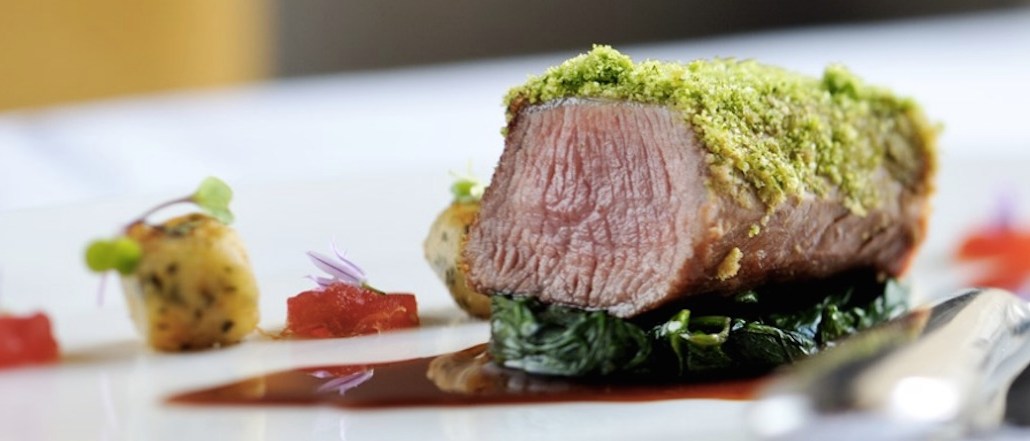Secure your place at the Digiday Media Buying Summit in Nashville, March 2-4
Great British Chefs brings a ‘geeky’ bent to its foodie fare and branded content

Amid the explosion of fast Facebook-friendly food videos looking for ways to monetize, Great British Chefs has chosen a different route.
The publisher launched in 2010 as an alternative to celebrity-driven recipe sites launched by chefs like Jamie Oliver, Nigella Lawson and Delia Smith. The 22-person company creates around 40 written features and up to 100 recipes a month, working with in-house teams and also with its network of 150 chefs, often Michelin-rated.
“We wanted to tell passionate stories for foodie people and connect with the greatest cooking talent in Britain,” said CEO and founder Ollie Lloyd. “No one was really looking at the more geeky world of food, like they were with other things, like cycling.”
Great British Chefs can get quite specific: To tie in with British Tomato week, it’s currently showing off its 142 recipes on tomatoes, like a cherry tomato gazpacho recipe and a tomato risotto recipe. But it also goes deep. With the Olympics in Rio coming up, London-based Brazilian chef Marcello Tully has written a series of features about Brazilian cuisine. “Our 3000 recipes come from legends,” said Lloyd, “whether it’s a cheese sandwich or a sous vide rabbit.”
As a former Unilever employee, Lloyd points out that Great British Chefs is a publisher run by a marketer. “We have always looked at the world through the lens of the brands that we work with,” he said.
As such, Great British Chefs works closely with other brands: 15 percent of the content on the site is part of a brand ad campaign, whether it’s a recipe, feature, competition or a video, created by the same people running the editorial. Lloyd said the publisher works with brands with a heritage or a hand in sustainable produce.
Great British Chefs decided early on to create content for just one brand from each category. So, for coffee, the publisher will work only with Lavazza coffee. For juice, it’s Cawston Press. Peter’s Yard cheese biscuits is the publisher’s cracker partner. Each of these brands has 100 percent share of voice for its respective product. With few display ad placements on site, each one is bought through direct buys as part of an integrated campaign, so that a brand isn’t diluted by a competitor appearing underneath.
Peter’s Yard, for example, came to Great British Chefs with the idea of making the cracker integral to any cheese board. The publisher created this recipe for gooseberry chutney with cheese. Mention of the brand is minimal: The recipe is “brought to you in association with Peter’s Yard; the cheese and chutney is to be served on “small crispbreads, preferably Peter’s Yard 50mm.” In its recipes that are not sponsored, Great British Chefs does not mention any brand at all.
“We’re supposed to be arbiters of excellence and taste; seeing rival brands lacks authenticity,” he said. “It also means our annual renewal rate is high: Over 75 percent of 2014’s clients renewed in 2015. Brands don’t want their competitor to get in there.”
Part of its offering is, of course, video, which the publisher makes about 150 a year, but eschewing the entertainment-led Facebook-friendly fodder, it uses it for tutorials, ranging at the bottom end of how to dice an aubergine, to longer documentaries on a Norwegian trout fishing voyage.
In recent years, more publishers have turned to content marketing to supplement falling display ad revenue. But the amount of media spend booked as part of integrated campaign with Great British Chefs has increased as its reach has grown.
Great British Chefs is starting to catch up with competitors. According to analytics from SimilarWeb, which measured desktop and mobile traffic over the last eight months, it found that Great British Chefs had a lower bounce rate than BBC Good Food (66 percent compared to BBC Good Food’s 71 percent) and more pages per visit (2.16 to BBC Good Food’s 1.80).
While BBC Good Food’s monthly visits are still much bigger at 13.7 million monthly visits compared to half a million, Great British Chefs is edging up behind rivals like Deliaonline.com and Deliciousmagazine.co.uk. “It’s a war of attrition,” said Lloyd.
Images via Great British Chefs.
More in Media

From feeds to streets: How mega influencer Haley Baylee is diversifying beyond platform algorithms
Kalil is partnering with LinkNYC to take her social media content into the real world and the streets of NYC.

‘A brand trip’: How the creator economy showed up at this year’s Super Bowl
Super Bowl 2026 had more on-the-ground brand activations and creator participation than ever, showcasing how it’s become a massive IRL moment for the creator economy.

Media Briefing: Turning scraped content into paid assets — Amazon and Microsoft build AI marketplaces
Amazon plans an AI content marketplace to join Microsoft’s efforts and pay publishers — but it relies on AI com stop scraping for free.





